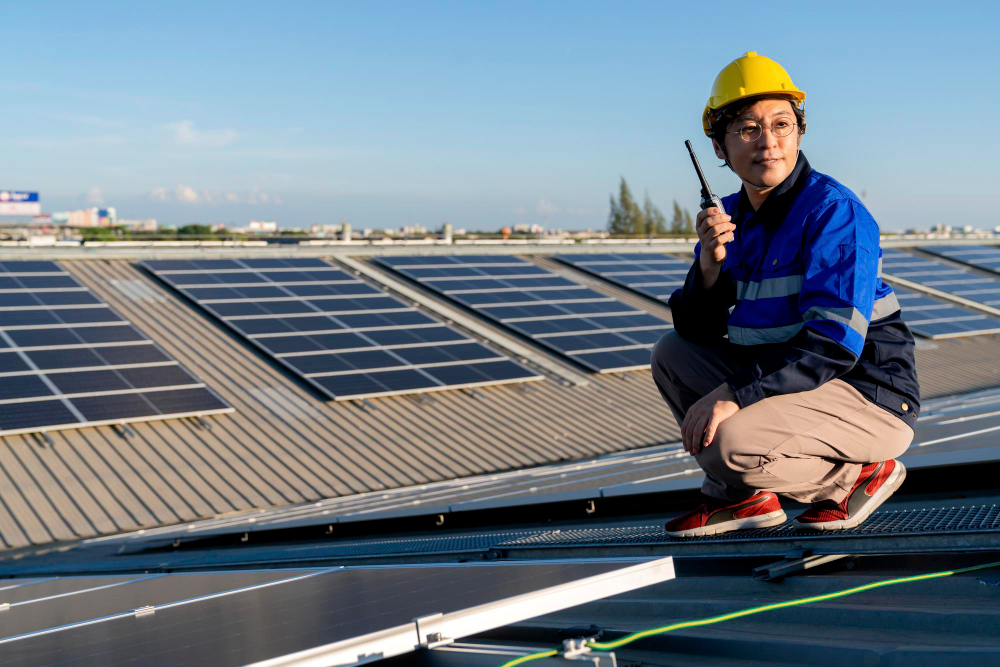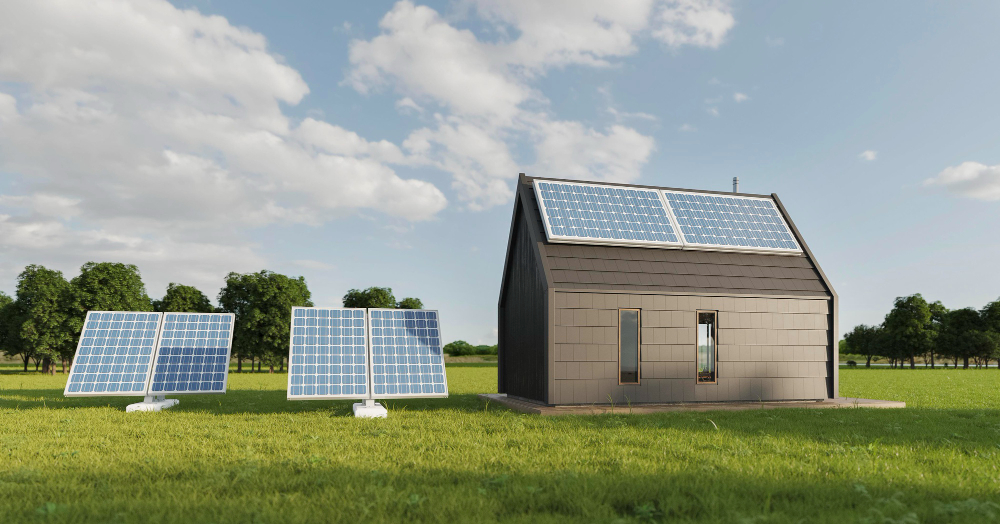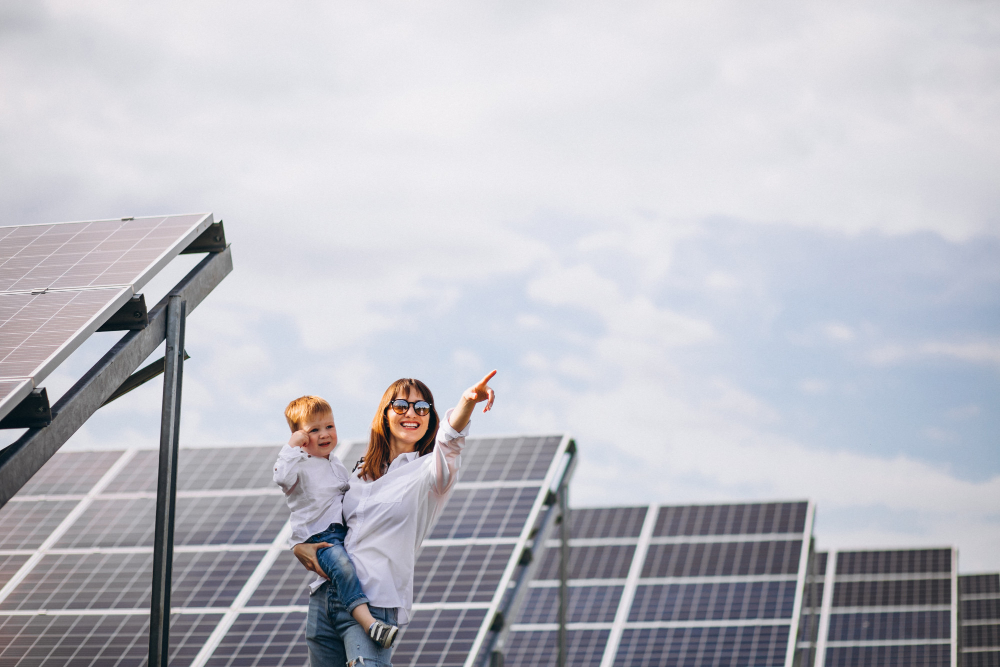Table of Contents
ToggleThe world is increasingly leaning towards sustainable living. Thus, more people value the advantages of using solar panels. As the earth’s most abundant energy source, the sun is potentially reliable to cater for our energy needs.
It is possible to power homes, businesses, and even vehicles with energy derived from the sun’s rays through solar thermal electric generation (STEG) power plants. However, it’s essential to know how solar cells work.
Sunlight is converted into direct current (DC) power by a photovoltaic (PV) cell in a solar panel. When you plug it into an inverter, the current is changed to alternating current (AC), which your home’s electronics run on.
Uses of solar panels
Solar energy can be used for everything that requires electricity to work, from lighting to electronics, machines and data centres. A roof with PV panels is sufficient to deliver significant power bill savings and secure an energy-free, sustainable future.
In addition to their use in household and commercial solar electric systems, portable solar panels have many other potential applications. For instance, remote energy systems for cabins, remote sensing, and telecommunications equipment.
The U.S. and Europe are seeing commercial solar electric automobiles or solar cars that can add 15-45 miles on a clear day. For longer rides, these cars function like ordinary electric vehicles (EVs) since they include lithium-based batteries which can be charged from the grid. However, commuters’ and short-distance drivers’ miles could be powered almost entirely by the sun at zero cost.
Advantages of solar energy


If you’re on the fence about solar power, here are some advantages you’ll reap by installing solar panels.
1. Environmental benefits
Using fossil fuels to generate power may be practical, but it has severe consequences for the earth. Solar panels are an investment in a clean, renewable energy source that benefits our environment.
Solar energy production has zero negative environmental impact on air and water. It is also carbon-free, as solar panels release no harmful emissions that contribute to greenhouse gases. As a bonus, it helps in conserving limited non-renewable energy supplies.
2. Reduced electricity bills
Since solar systems can generate electricity independently, utility bills will reduce. However, the amount saved depends on how much electricity is used and the solar system size.
The more electricity you need, the more solar panels can help you to save power costs. That is why companies benefit a lot from installing commercial solar panels.
3. Long-term cost efficiency
Using solar energy means paying less or no power bill. Because solar energy is generated during the day, it will offset the highest peak electricity rates.
Besides, utility prices are increasing due to inflation, like all other commodities. Having your own electricity source will enable you to avoid this cost inflation in the future as you won’t have to buy electricity from the government.
4. Energy independence
Solar panels make you energy independent. You do not have to rely on the traditional power grid. As a result, you have long-term energy security.
5. Easy to install
Most solar panels already have a mounting system, so you do not need to build anything yourself. You only need a sunny spot where you can put them.
They also come in different sizes. The three most common sizes are 60-cell, 72-cell, and 96-cell. You can choose the size which will best fit your chosen spot. As for installation, you can hire a professional or DIY. If you decide to DIY, solar panel kits come in handy as they consist of everything you need to set up your own solar system.
6. Various types to suit your needs
They are a variety of solar panels to serve your specific needs. For example, most people setup solar panels on roofs for residential purposes, while others opt for solar glass windows or solar shingles. People also use portable solar panels if they need to power their devices while travelling.
7. Low maintenance costs
Solar power systems only need a little maintenance since there are no moving parts for wear and tear. The solar inverter is the only part that needs to be replaced after 5-10 years. Cleaning them twice a year would suffice. However, you must keep the cables in good shape to operate at peak efficiency.
8. Increases your property value
Although the added benefit varies by location, the National Renewable Energy Laboratory (NREL) reported that every $1 saved on electricity expenses increases property value by $20.
Besides, it is an excellent selling point for real estate brokers when you put it up for sale. According to Zillow, properties with solar panels sold for 4.1% more than similar properties without solar power over the last year.
9. Excess solar energy can be sold to the grid
If your solar PV system produces more electricity than you need, you can sell it back to the power grid and be compensated. A net metering connection connects your solar PV system to the primary electricity grid, allowing you to sell the excess energy.
10. Long-lasting warranties
Solar panels have a performance warranty that typically guarantees 90% output after ten years and 80% output after 25 years. In addition, they have a standard equipment warranty of 10 to 12 years. It also covers defective equipment parts, atmospheric issues, and premature wear and tear.
11. It can be used in all seasons
Solar energy systems can produce electricity in any weather. However, one of their drawbacks is they are prone to temporary weather disturbances. Nonetheless, rainwater can help wash away dust and grime from solar panels. During winter, snow melting on the panels helps to keep them clean. Then, they can produce more electricity when the sun reflects off the snow.
For more information, read Do solar panels work on cloudy or rainy days?
If you live in an area with limited sunlight certain times of the year, a solar battery bank can help ensure that you have enough power for your home.
12. Solar technology is becoming more advanced
Solar power technology is continually evolving, and advancements will continue in the future. For example, quantum physics and nano-technology advancements have the potential to boost the effectiveness, financial returns, and versatility of solar panels. Likewise, it could increase the electrical input of solar power systems by many folds.
Is solar energy worth the investment?


Yes, over time, solar panels have become more efficient, inexpensive, and dependable, saving you money on electricity bills while paying back your investments in record time.
Besides, many governments encourage installing solar panels to promote a sustainable lifestyle. As a result, you may be eligible for incentives and tax credits to help cut your household cost. In addition, you can receive credit from your electricity provider for the surplus energy you generate by selling it back to the grid.
How much can solar panels save?
An average household utility user needs 10,715 kWh annually. At $0.14 per kWh, the average American family’s annual electric cost is $1,500. According to research, PV energy can save $44 to $187 per month.
Solar panels save American families $2,200 per year on electricity. Over their lifespan, they can save up to $10,000 to $40,000. This represents substantial savings for the majority of American households.
However, if you live in a state with more significant solar tax credits and laws, you can install additional panels to save more per year.
How long do solar panels last?
Solar panels have a 25 to 30-year lifespan. Nevertheless, they can last decades if they’re not ruined by wind, weather, debris, or other external circumstances. However, their electricity production may reduce when they are close to the end of their lifetime.
Is getting solar panels worth it?
Solar panels are a good investment, but there is no one-size-fits-all energy solution. Consider the following factors to determine if you are a good candidate for solar:
- Direct sunlight: Check if your rooftop receives direct sunlight for solar panels to absorb sufficient heat to convert them into electricity.
- Solar-ready roof: Find out how much electricity you need to run your household sufficiently to determine the number of solar panels you need. Then, you have to ensure that you have enough space for that many panels on your roof.
- Current electricity bills: Solar has installation and maintenance costs. So, if your electricity bill is already low, they might not help you save much.
- State or utility policy: Check if your utility or state has a net metering plan and its repurchase rate.
- Value sustainability: Consider how much you prioritise sustainable living. Solar panels are the way to go if it is an important value in your life.
These aspects can help you determine whether solar is worth it. Still, the best way to receive an exact estimate is to speak with local solar businesses. They can assess your electrical patterns, create a model of your roof using satellite photos, and provide accurate pricing and financing information.
Concluding remark
Along with being environmentally friendly, renewable, and plentiful, solar panels have economic and social advantages. They provide a reliable and independent energy supply in remote and rural places, allowing development to proceed more rapidly and at a cheaper cost. So, when installing PV solar systems, remember that it is a long-term investment.






This Post Has One Comment
Thanks for helping me understand how solar panels help you harness solar energy to power your living space. My uncle talked about how he wants to save money during his retirement. I should talk to him about finding a solar energy company that can help someday.